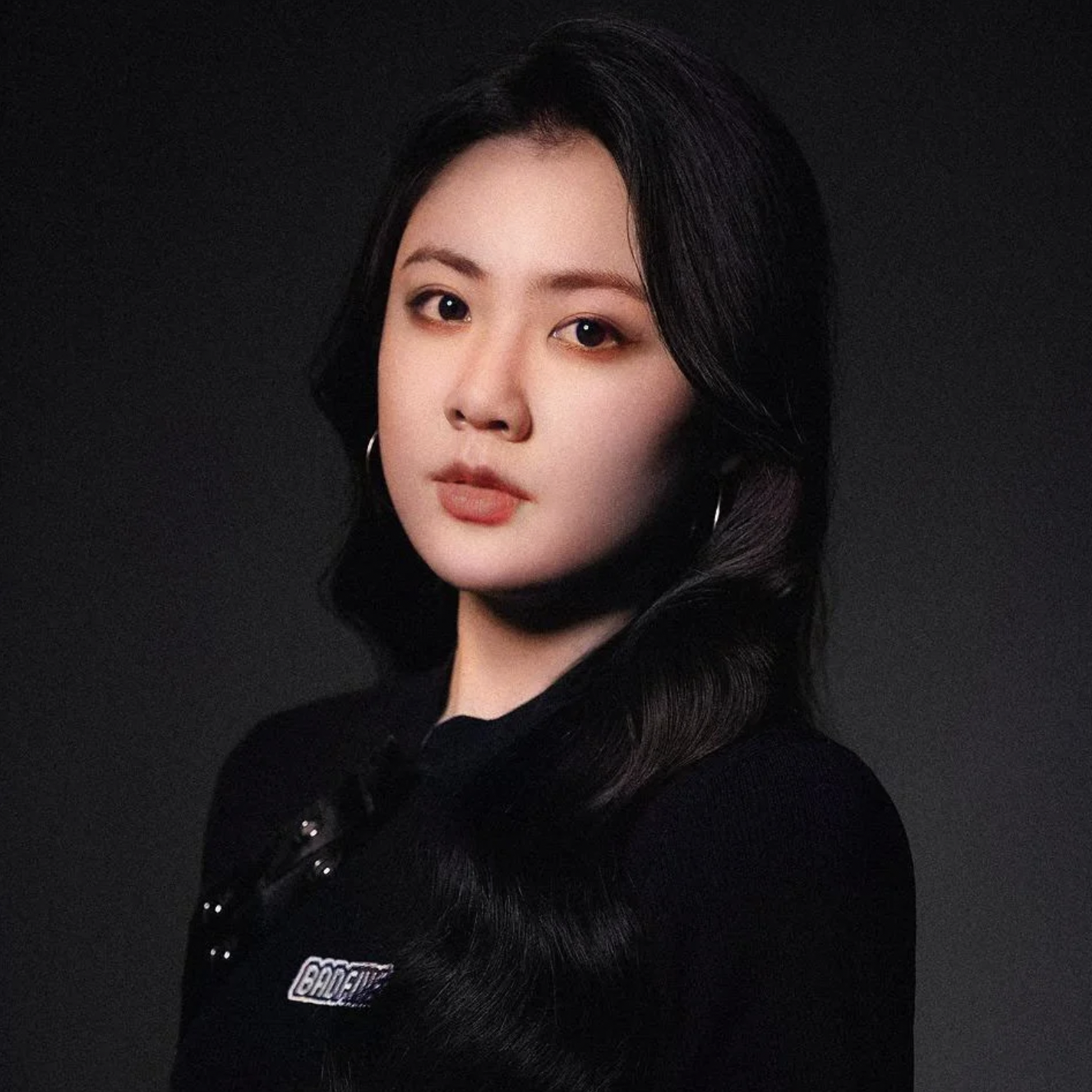A conversation with Siz Wang
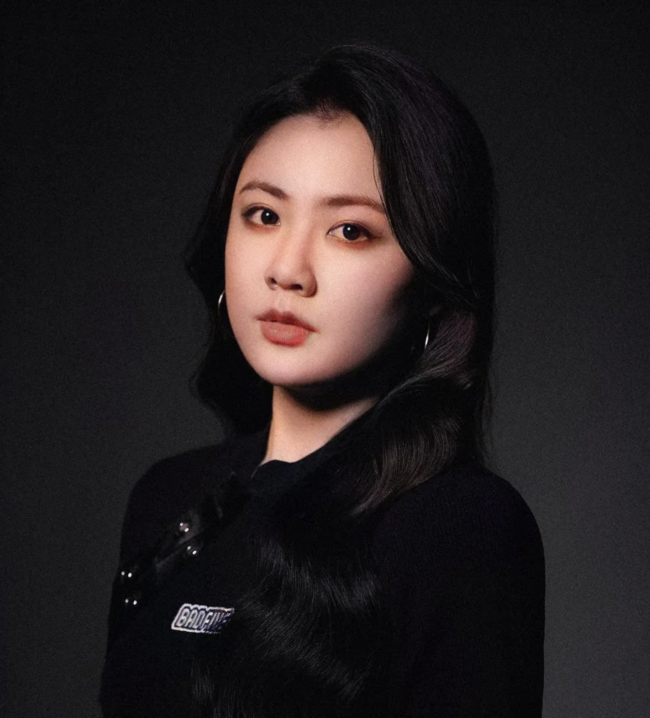
Every school has a talented upperclassman who is told as a legend over lunch breaks. Mulan Fu is that legend in the 2020s at the NYU Animation Area.
I started college in the year of the pandemic, so I never met her when she was still in school. I couldn’t recall how exactly I came to know Mulan. She almost sounded like a fictional existence. We probably came across each other online at some point. Over several years of observations, I developed an impression that, regardless of how many words people use to praise her youth and accomplishments, Mulan is humbly putting herself on the more friendly and responsive end of the approachability spectrum.
NYU invited Mulan back to campus for a presentation and Q&A session last year. Though we moved all our chairs into one classroom, they still got outnumbered by her fans. Many were eager to learn how she found resolutions to artistic dilemmas not taught at school. Students wanted to borrow her secret recipe for animation career success. How did she discover her unique art style while others still struggle with imitations? How did she find her internships and jobs in a more-than-ever competitive market? How did she acquire such a large fan base on social media? Those were the central questions on people’s minds. Mulan responded upfrontly. She is generous not only to her audience but also to aspiring artists seeking advice.
When Doug asked me if I would recommend any candidate for the aNYmator column, I immediately thought of Mulan. As an independent animation director, Mulan has won a handful of awards at international film festivals. Her clients include Hornet, Condé Nast, Amazon Prime Video, Coca-Cola, and the NYC Department of Education. Mulan previously worked at Pearl Studio and is now a creative producer at HoYoverse.
Knowing how quintessential independence is as a fellow international student, I sat down with Mulan for an intimate and in-depth conversation. This interview is conducted with the hope that our discussion may shed some light on the young artists who are just feeling a little lost figuring out their future plans.
Hi Mulan, Thanks for coming. This interview is us, ASIFA-East, getting to know you, hopefully by having a deep conversation about your experience studying and living in New York City as an animator. We have a newsletter called The aNYmator, except we replaced NI with NY for New York. It’s just a zine focusing on discovering local animation filmmakers who are relatively established in their careers. We would like to share your experience with a wider audience.
Awesome. Thanks for the intro. It’s an honor.
Yeah, that’s the background information. Now, my first question would be, can you give us an introduction of yourself?
Of course. My name is Mulan. I wear many hats. I’m a 2D animator, director, and creative producer. I have worked as a director and an animator across multiple jobs and personal projects. I’m currently a creative producer at Hoyoverse, the game studio behind Genshin Impact and Honkai Star Rail. I primarily focus on creative development and creative production of 2D animated content specifically for Genshin Impact, but I also have never stopped making personal films. I still work as a 2D animator on my personal projects, and I pretty much do animation every day. So, yeah, that’s me. I live in New York. That’s good.
How did you discover your initial interest in animation? Did you find out in childhood or college?
I can trace it back to kindergarten. I found my earliest piece of fan art to be from kindergarten. It was a really poorly drawn childhood doodle of Princess Mononoke.
I have a Mononoke poster in my study. I don’t know if you can see it, but it’s over there.
Yo, that’s huge. That’s awesome. I can’t name a time when I didn’t love animation. Animation has always been a huge passion for me. It was my go-to thing to do during my leisure time. I enjoy going to anime conventions, looking at cosplay and manga, buying merchandise, and that sort of anime lifestyle. I didn’t really ever consider being in the industry until middle school when we got to explore more artistic mediums in interest groups and art classes. That’s when I finally got the chance to explore what animation really is and how it’s done. I started by making little flipbooks on the corners of a textbook or something during class, and then I made little clay figures and did little claymation by myself. That experience was super enjoyable to me. It was the trigger and motivation for my further animation exploration in high school and finally in college.
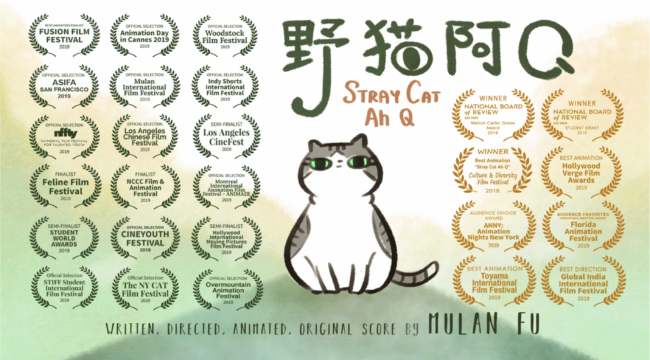
When I went to NYU, I chose film as my major, but I basically focused on animation as a concentration and finally started making my own personal animated shorts. There was nothing that really held me back. The shorts were something that actually made me care more about the craft and more interested in the world in general. You know, we can see a lot of really, really cool boundary-breaking visual styles in short-form animated content. From TV, to features, to advertisements, I just really loved all of these different animation formats. So, in the pretty early years of college, I decided animation was where I wanted to be professionally, and yeah, here I am.
So, it seems like animation has always been a calling for you, and it’s not something you need to think really hard about.
Yeah! It’s a fun story. Though I don’t know if this is a coincidence, destiny, or if my parents just kind of predicted it, my original name was not Mulan. I changed my legal name to Mulan when I was three years old. At the time, I watched Disney’s Mulan 2D film almost ten times a day. One day, I just turned around to my mom and asked, “Why can’t I be called Mulan?” My mom checked those Chinese fortune-telling books to see how good that name was. Then, my parents were like, “Whoa, this is big fortune!” So, they happily changed my legal name to Mulan.
What was your name?
My original name was Fu Xin, so like Xin Fu (In Chinese, reading this name backward would make it sound the same as the pronunciation for “happiness.”)
Ah! I remember when I first heard your name when I got into NYU, I immediately thought of the Disney film Mulan. Here is an animator called Mulan? That’s strangely coincidental. I wondered if it had anything to do with the film.
It has everything to do with the film. Every time I think about it afterward, I wonder if that may be the calling or something. But yeah, I love the name. I love the film. I love animation.
That’s awesome. That’s a mystery solved for me. It has been on my mind for maybe 5 years. Without thinking, you know that you want to be an animator, but what was your initial vision of yourself becoming an animator?
I didn’t really have a vision. I just wanted to be in the industry and make cool things. I want to make cool animations. Wherever that brings me, I will go.
However, I did have a clear vision of how I wanted to plan my life around whatever career I might have. I wanted to make sure that I had enough personal time and that I could keep the drive to create independent projects aside from whatever job I wanted to do. That’s something that I wanted to make sure when I was job hunting and actually working.
That’s excellent high-level thinking.
Thank you. It derives from actual experience. When you work – even if you’re working in an industry that you love and creating things that you love – you will always work on things based on other people’s commercial interests. Especially in corporates, there are a lot of restrictions and work-related politics to take into consideration. Everything like that can make the work-life balance a little bit more complicated. I always make sure there’s at least something I’m doing with my time that completely belongs to me and not to a company, or a brand, or something equivalent.
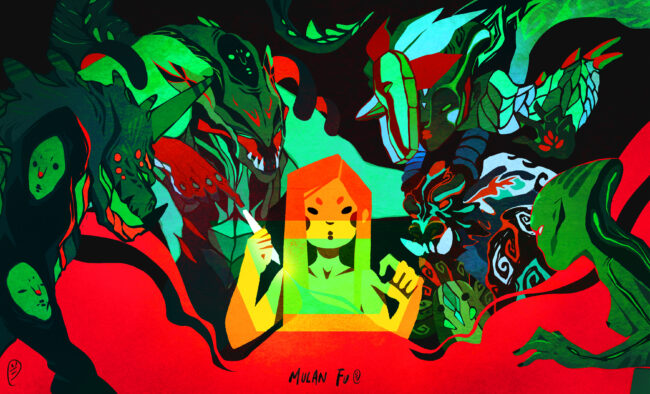
Okay, so your initial goal was to be able to balance your personal life and your commercial work life. Did you encounter any challenges throughout the journey? Has your vision ever changed, or do you ever doubt it?
Yeah, all the time, especially working in my current role as a producer. I must stay on top of all the deadlines and countdowns across multiple productions. It can definitely eat into your energy.
It takes a lot of self-control and clarity to set boundaries to maintain your work-life balance. Nobody else is going to help you plan your day, tell you when to stop working, or tell you to stop thinking about your job. You have to be the actual person figuring out your personal life. I prefer to keep two hours of relaxation time a day to work on my projects and do hardcore animation for my film. The major obstacle is when you get up from your desk after eight or nine hours of work per day, you still need a way to maintain your drive. You must learn to relax, lie down, and take a breather. Then, your brain can whip you to sit back up again to work on your personal project. Self-monitorization is the hardest part.
You sound strongly independent, but did you ever have a time when you felt you needed external help? Was there anyone you can think of in your life or in your career journey who has been instrumental to you?
Immediately, my parents, because they’re both artists.
They’re not animators, but they’re both artists in the film industry. This is in the blood line, I guess. They’re both basically freelancers for life. They both know how much work it takes to get creative work done and also how difficult it is to trust yourself and hold on to something that’s completely creatively yours.
I have many conversations with my mom, especially because she’s an actress. We discuss character performances, scripts, and storylines. One of my short films is also inspired by her.
“Beautiful”?
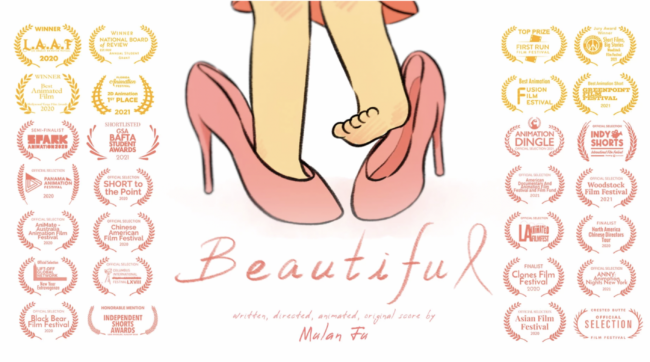
Yeah, exactly.
I think the relationship and the kind of creative competency I can have with my mom make me basically worriless. I don’t have to care about whether the idea is mature enough, the concepts are solid enough, or my progress is satisfactory enough because she’s not my client or my boss. She is my mom. She wants my personal creative work to be done more than I do.
So a lot of times, when I’m super burnt out from work or whatever and lose that drive to spend extra hours during the day working on my personal stuff, she’s always the one who checks in and asks, “How’s your film going? Are you making progress?” It can be pressure from another perspective, but I really appreciate it.
That’s a very sweet and motivational family dynamic. Speaking of your personal art, from my perspective, you have a particularly bold and visually metaphorical expressive art style. However, that’s how I zz
I think you just summarized it quite correctly. Those are the keywords that I get attracted to when I look at other artworks, like bold colors, bold brush strokes, and metaphorical motifs. Those are things that I really love seeing in other people’s artworks as well.
Culturally, a hundred percent. I get a lot of influence and inspiration from Chinese mythology and just mythology overall.
There was a time period, especially during high school, when my entire bookshelf was just packed with books about spiritual interpretations of things in concrete behaviors or symbols.
I think it was around the end of my college years that I really solidified this style, which was when we were diving right into COVID. I graduated college in 2020. And that was the COVID year. The world was chaotic. Everybody’s plan was screwed up. Nobody had a plan. The world turned upside down. A lot of things are happening. A lot of things, personally, professionally, everything.
We were forced to spend a lot of time in our own minds, and I think many people experience this. We were forced to interact only with the world online, on the internet, which is a very chaotic place. The Internet can be very helpful and inspiring, but it can also get extremely toxic sometimes.
I remember seeing some of your personal art from the time, like a picture of a girl getting devoured by a phone.
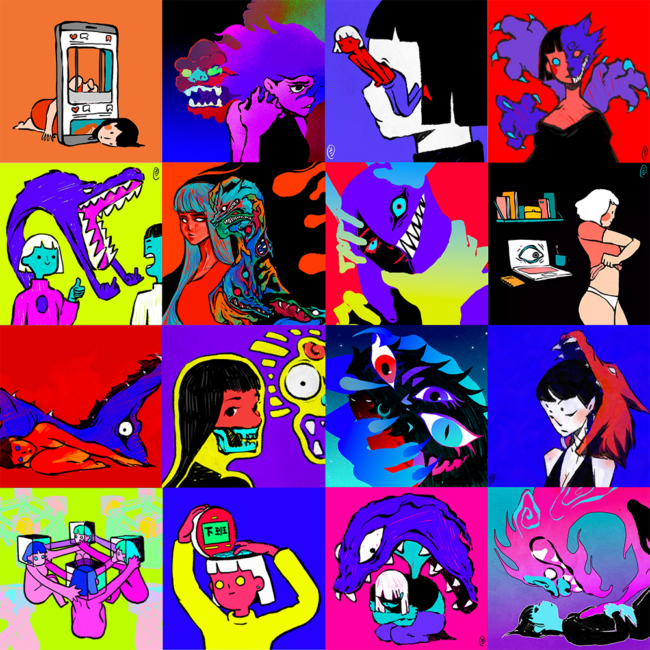
Yeah, I can speak to that, too. I think that contributed to my motivation. It felt natural and cathartic to make those little doodles to express my feelings toward some of the behaviors and things I observed. Later on, it developed into this sort of style that I kept. I think those are the two major inspirations if not trigger points.
So, going back to your career, you established a pretty solid career early on. What was your thought process in terms of career development? Did you have a clear blueprint, or was it a free flow?
I had no idea about my career. I think that’s especially true about students in art school. We just have no concrete idea what the world outside is like because we didn’t know the art world is a lot more relationship-based, network-based, and experience-based. And then also because, once again, I graduated with COVID-19, and COVID-19 changed the film industry completely.
even if I had a plan back then, it would get thrown out of the window.
I was really lucky to get an internship at Pearl Studio in the creative development department, which is something that I really, really enjoyed working on. Creative development is a super early stage of the feature film development process. I think it was towards the second year of graduate school that I started working full-time at Pearl Studio doing precisely that. Starting from there, my career was a free flow because I didn’t know what the world would turn out to be. COVID changed a lot of jobs and companies. Some companies just vanished, while some other new companies came out. I think where I want to be in terms of my personal life has changed and shifted since, which then impacted my professional career planning, but most of it was really just following the flow. We cannot predict our own future, after all.
Yeah. We just have to embrace it. Speaking of your career and your graduate program, having a full-time job in a game production company, how does this day job affect your animation practice? Does it help?
I work for HoYoverse’s branding and marketing team, creating animated content to promote the games. That’s the essence of my job.
It is a pretty linear experience stemming from my animation practice because now I’m still kind of the animation person. I basically came up with the creative direction, the art direction, and the script for the animation projects that we are making at HoYoverse, and I see it through execution as a producer.
So, my day job didn’t take me away from animation. It actually got me closer to the actual day-to-day execution of animation projects. It’s a lot of fun because I get to work on the shorter-form projects. We get to work with crazy talented and stylistically adventurous animation studios to develop and invent new styles that you can’t necessarily put into a pipeline for a longer form, but you can experiment with super fun stuff in short form. That’s something we get to do with game promotional content.
That’s good to hear. Thank you for clarifying. I think I’m going to ask this next question for a lot of our peers, like people around our age, though maybe some people who are more advanced in their careers also have the same struggle. The question is, nowadays, in and out of the animation industry and in the broader entertainment industry, artists are expected to have a solid social media presence, and a lot of us struggle with it, but you seem to have a pretty broad audience on social media – Do you mind sharing a little bit of your trade secrets? How do you grow your account and sustain attention?
One thing was, during COVID, everybody was on their phone. And two, I was posting very frequently, pretty much every day or every other day. That was the only thing that I can trace to that I think contributed to my social media followings. I have no idea about anything else involved in planning your content and maintaining attention on social media.
Content-wise, I think it’s really just up to the artist. I really don’t think you should cater whatever you’re drawing or creating to the social media platform because that kind of breaks the purpose, though I do think posting frequently is pretty important.
Let’s talk about your short film. I know you are cooking up a new film right now. Can you tell us anything about it, or is it confidential?
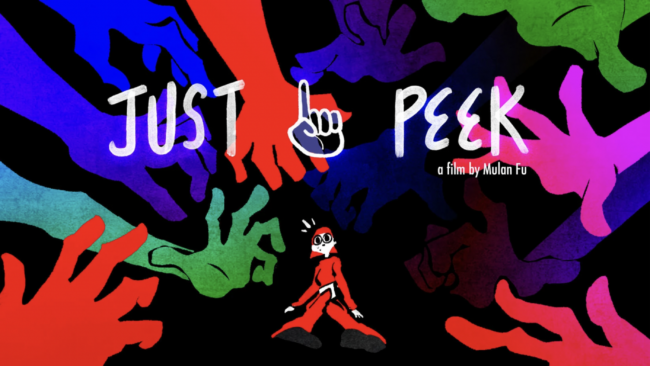
No, it’s not. It’s basically something that stems from the doodles that I created during COVID-19 about human interactions on social media.
I’ve always wanted to explore that topic further. I wanted to create some longer content about humans and technology. I think a lot of studios are tapping into the same genre right now, such as DreamWorks making the Wild Robot. Some studios made some human-machine-dynamic films decades ago. We’re getting back to that topic.
My final question would be, is there anything that you are currently struggling with? In our entire conversation, we have mostly been talking about your insights, about the more successful part of you. But as a human, is there anything that you are currently struggling with?
Yeah, I would say the biggest thing is that I’m too far away from my family. My parents are in Shanghai. My entire family is in Shanghai and China. I’m the only one hanging out in the other hemisphere, so that’s something that I am struggling with.
I really enjoy being in the city. I think that’s something I would have to find a solution for eventually, within a few years. I think a lot of my peers, especially international students or third culture students are also experiencing and struggling with the same thing. Whenever the Chinese New Year comes, when everyone is celebrating, and I notice that I’m the only one who’s away, it feels kind of sad, so I hope I can find the perfect balance between family and my personal goals.
Good luck with that! Thank you so much for disclosing everything we talked about in today’s interview and for making the time.

